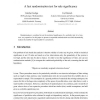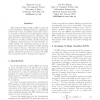7 search results - page 1 / 2 » A Fast Randomisation Test for Rule Significance |
RSCTC
2010
Springer
13 years 2 months ago
2010
Springer
Randomisation is a method to test the statistical significance of a symbolic rule; it is, however, very expensive. In this paper we present a sequential randomisation test which d...
APPINF
2003
13 years 6 months ago
2003
Discovering association rules by identifying relationships among sets of items in a transaction database is an important problem in Data Mining. Finding frequent itemsets is compu...
WAW
2010
Springer
13 years 2 months ago
2010
Springer
Abstract. Motivated by social network data mining problems such as link prediction and collaborative filtering, significant research effort has been devoted to computing topologica...
BMCBI
2006
13 years 4 months ago
2006
Background: The number of sequences compiled in many genome projects is growing exponentially, but most of them have not been characterized experimentally. An automatic annotation...
ICPR
2004
IEEE
14 years 5 months ago
2004
IEEE
The Scanning N-Tuple classifier (SNT) is a fast and accurate method for classifying sequences. Applications include both on-line and off-line hand-written character recognition. S...


